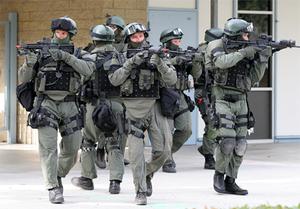Law-enforcement technologyACLU looks into the use of military technology by local law-enforcement
Affiliates of the American Civil Liberties Union in twenty-three difference states have filed more than 255 requests for public records in order to determine how many local police departments are using federally subsidized military technology and tactics – technology and tactics which have that have traditionally been used on battlefields overseas such as, most recently, in the Iraq and Afghanistan wars.

Once again, the ACLU attempts to hamper appropriate policing // Source: haberkibris.com
Affiliates of the American Civil Liberties Union in twenty-three states have filed more than 255 requests for public records in order to determine how many local police departments are using federally subsidized military technology and tactics – technology and tactics which have traditionally been used on battlefields overseas such as, most recently, Iraq and Afghanistan. The ACLU says that its affiliates which filed these requests include Arizona, Connecticut, Delaware, Florida, Georgia, Hawaii, Maine, Massachusetts, Michigan, Mississippi, Missouri, Montana, Nebraska, New Jersey, North Carolina, Pennsylvania, Rhode Island, South Carolina, Texas, Utah, Washington, West Virginia, and Wisconsin.
“Equipping state and local law enforcement with military weapons and vehicles, military tactical training, and actual military assistance to conduct traditional law enforcement erodes civil liberties and encourages increasingly aggressive policing, particularly in poor neighborhoods and communities of color,” said Kara Dansky, senior counsel for the ACLU’s Center for Justice. “We’ve seen examples of this in several localities, but we don’t know the dimensions of the problem.”
The requests also seek information about the number of SWAT teams and their deployments, purposes, and the types of weapons these SWAT units carried or used during these deployments, and what injuries were sustained by civilians. The requests also see information about training methods and funding.
The ACLU says it is interested to find out whether local police agencies were using cutting edge weapons and technologies such as GPS tracking devices; unmanned aerial vehicles, or “drones”; augmented detainee restraint, or “shock-cuffs”; military weaponry, equipment, and vehicles obtained from or funded by federal agencies such as the Departments of Defense or Homeland Security, and more.
ACLU affiliates have also filed requests with the National Guard in those states, requesting information on the agreements between the National Guard and local police department’s counter-drug programs and the number of incidents in which National Guard units handled civilians.
The ACLU says it wants the public to know what their law enforcement agencies are using and whether the equipment is necessary for local enforcement.
“The American people deserve to know how much our local police are using military weapons and tactics for everyday policing,” Allie Bohm, ACLU advocacy and policy strategist said. “The militarization of local police is a threat to Americans’ right to live without fear of military-style intervention in their daily lives, and we need to make sure these resources and tactics are deployed only with rigorous oversight and strong legal protections.”
When all the data is collected and analyzed, the ACLU will give its opinions and, if necessary, recommend changes in law and policy regarding use of military tactics and weapons in local law enforcement missions.
